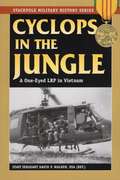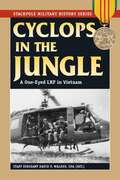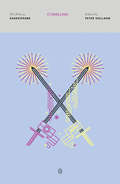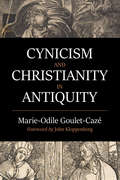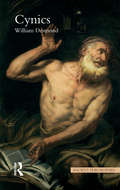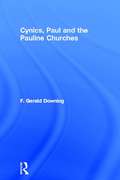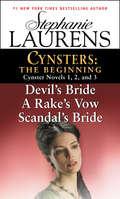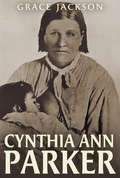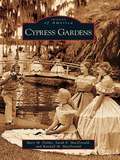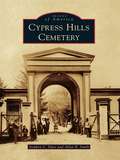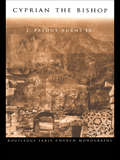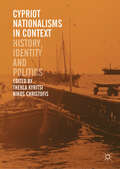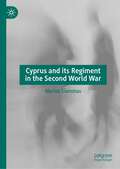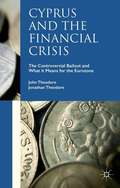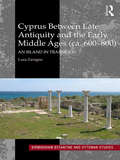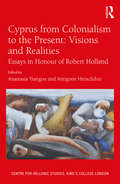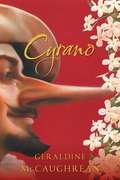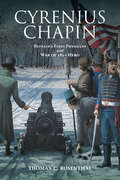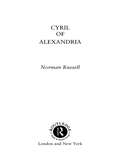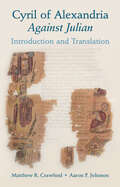- Table View
- List View
Cyclops
by Ranko MarinkoviIn his semiautobiographical novel, Cyclops, Croatian writer Ranko Marinkovic recounts the adventures of young theater critic Melkior Tresic, an archetypal antihero who decides to starve himself to avoid fighting in the front lines of World War II. As he wanders the streets of Zagreb in a near-hallucinatory state of paranoia and malnourishment, Melkior encounters a colorful circus of characters—fortune-tellers, shamans, actors, prostitutes, bohemians, and café intellectuals—all living in a fragile dream of a society about to be changed forever.
Cyclops In The Jungle: A One-eyed Lrp In Vietnam
by David P. WalkerDave Walker enlisted in the U.S. Army at seventeen, full of patriotism and eager to play his part in Vietnam. Trained for long-range patrol (LRP) operations, he received a debilitating shrapnel wound to his eye barely a month after arriving in Vietnam. Medically discharged and sent home to a country he decreasingly recognised, Walker, now missing an eye, manoeuvred his way back to the jungles of Vietnam, where he survived another eighteen months conducting patrols and special operations with an elite Ranger unit.
Cyclops in the Jungle (Stackpole Military History Series)
by David P. USAOne-of-a-kind story of resilience and determination in the Vietnam War. Combat action with a long-range patrol (LRP) team. Written in a no-holds-barred, from-the-gut style.
Cymbeline: Aus: [dramatische Werke] [shakspeare's Dramatische Werke], [bd. 32] (The Pelican Shakespeare)
by William Shakespeare Stephen Orgel Peter Holland A. R. Braunmuller"I feel that I have spent half my career with one or another Pelican Shakespeare in my back pocket. Convenience, however, is the least important aspect of the new Pelican Shakespeare series. Here is an elegant and clear text for either the study or the rehearsal room, notes where you need them and the distinguished scholarship of the general editors, Stephen Orgel and A. R. Braunmuller who understand that these are plays for performance as well as great texts for contemplation." (Patrick Stewart)The distinguished Pelican Shakespeare series, which has sold more than four million copies, is now completely revised and repackaged.Each volume features:* Authoritative, reliable texts* High quality introductions and notes* New, more readable trade trim size* An essay on the theatrical world of Shakespeare and essays on Shakespeare's life and the selection of texts
Cynara
by Janis Flores"I'm not your wife!" she shouted furiously. "It was all a trick. Let me go, Evan!" He didn't answer. Couldn't answer. Her nearness was intoxicating, and he couldn't stop himself. Bending his head, he kissed her. The touch of his lips was like fire. Cynara struggled against him, her hands pushing vainly against his chest. His mouth was demanding, and despite her fury, she felt herself responding. Suddenly she was caught up in a wave of desire so strong that she pressed her body into his and wound her arms around his neck. This, she thought dazedly, this was what it was like to be loved. She felt lifted, transported, breathless, and she wanted to prolong this moment forever. "Evan," she whispered, "wait . . ." But he was beyond hearing her. Caught up in his own delirium, he was conscious only of her slim white body under him . . . he was lost in her, drowning in the touch and scent of her. He had denied himself too long; all his senses screamed at him to take her, and he didn't hear her second, frightened protest. . . .
Cynicism and Christianity in Antiquity
by Marie-Odile Goulet-CazéWas Jesus a Cynic? Cynicism and Christianity in Antiquity is a literary tour de force analyzing and refuting the hypothesis that Jesus was a Cynic. Marie-Odile Goulet-Cazé examines the arguments submitted by some New Testament scholars who believe that Jesus and his disciples were influenced by the ethics and social behaviors of itinerant Cynic preachers. In examining the “Cynic Jesus hypothesis,” Goulet-Cazé offers a reliable, accessible, and fully documented summary of Cynicism and its ideas, from Diogenes to the Imperial Period, and she investigates the extent and nature of contact between Cynics and Jewish people, especially between 100 BCE and 100 CE. While recognizing similarities between the ideas and morals of ancient Cynicism and those evident in early Christian movements, Goulet-Cazé identifies more significant, fundamental differences between them in culture, theology, and worldview.
Cynicism and Christianity in Antiquity
by Marie-Odile Goulet-CazéWas Jesus a Cynic? Cynicism and Christianity in Antiquity is a literary tour de force analyzing and refuting the hypothesis that Jesus was a Cynic. Marie-Odile Goulet-Cazé examines the arguments submitted by some New Testament scholars who believe that Jesus and his disciples were influenced by the ethics and social behaviors of itinerant Cynic preachers. In examining the &“Cynic Jesus hypothesis,&” Goulet-Cazé offers a reliable, accessible, and fully documented summary of Cynicism and its ideas, from Diogenes to the Imperial Period, and she investigates the extent and nature of contact between Cynics and Jewish people, especially between 100 BCE and 100 CE. While recognizing similarities between the ideas and morals of ancient Cynicism and those evident in early Christian movements, Goulet-Cazé identifies more significant, fundamental differences between them in culture, theology, and worldview.
Cynics (Ancient Philosophies #3)
by William DesmondOnce regarded as a minor Socratic school, Cynicism is now admired as one of the more creative and influential philosophical movements in antiquity. First arising in the city-states of late classical Greece, Cynicism thrived through the Hellenistic and Roman periods, until the triumph of Christianity and the very end of pagan antiquity. In every age down to the present, its ideals of radical simplicity and freedom have alternately inspired and disturbed onlookers. This book offers a survey of Cynicism, its varied representatives and ideas, and the many contexts in which it operated. William Desmond introduces important ancient Cynics and their times, from Diogenes 'the Dog' in the fourth century BC to Sallustius in the fifth century AD. He details the Cynics' rejection of various traditional customs and the rebellious life-style for which they are notorious.The central chapters locate major Cynic themes (nature and the natural life, Fortune, self-sufficiency, cosmopolitanism) within the rich matrix of ideas debated by the ancient schools. The final chapter reviews some moments in the diverse legacy of Cynicism, from Jesus to Nietzsche.
Cynics, Paul and the Pauline Churches
by F. Gerald DowningF. Gerald Downing explores the teachings of Paul, arguing that the development of Paul's preaching and of the Pauline Church owed a great deal to the views of the vagabond Cynic philosophers, critics of the gods and of the ethos of civic society.F. Gerald Downing examines the New Testament writings of Paul, explaining how he would have been seen, heard, perceived and understood by his culturally and ethnically diverse converts and disciples. He engages in a lucid Pauline commentary and offers some startling and ground-breaking views of Paul and his Word.Cynics, Paul and the Pauline Churches is a unique and controversial book, particularly in its endorsement of the simple and ascetic life proffered in Paul's teachings in comparison with the greedy, consumerist and self-promoting nature of today's society.
Cynsters: The Beginning (A Cynster Collection)
by Stephanie LaurensGet the first three Cynster Novels in one boxed set from #1 New York Times bestselling author Stephanie Laurens! Fans of Regency-era historical romances with adventure and mystery will enjoy these stories of passionate alpha heroes and the ladies who bring them to their knees.Devil's BrideWas he the husband of her dreams . . . or a devil in disguise? When Devil, Duke of St. Ives, and the most infamous member of the Cynster family, is caught in a compromising position with governess Honoria Wetherby, he astonishes the entire ton by proposing marriage.Honoria, however, isn't about to bend society's demands and marry a man simply because they'd been discovered together unchaperoned. She craves adventure and longs to see the world--and though she's more than happy to assist Devil in solving the murder of a Cynster cousin, once the crime is put to rest she intends to bid Devil farewell forever.But she underestimates the seductive power of this daring, dangerous man and the scalding heat of her own unsated desire. Does she dare let passion carry her into Devil's embrace . . . and into the most perilous adventure of all?A Rake's VowHe vowed he'd never marry Vane Cynster knew the wind was blowing in a marrying direction. Other Cynster men might not mind stepping up to the altar, but Vane never wanted to be leg-shackled to any woman. Bellamy Hall seemed like the perfect place to temporarily hide from London's husband-hunters. But when he encounters Patience Debbington, Vane realizes he's met his match and soon he has more than seduction on his mind.She vowed no man would catch her Patience wasn't about to succumb to Vane's attentions. Yes, his kisses left her dizzy and his caresses made her melt, but he was arrogant, presumptuous . . . and, despite his protests, bound to be unfaithful, just like every other man. Patience has promised herself that she will never become vulnerable to a broken heart. But is this one vow that was meant to be broken?Scandal's Bride"He will father your children . . . "When Catriona Hennessy, Scottish Lady of the Vale, receives this prediction, she is aghast. How could she unite with a rake like Richard Cynster--a masterful man with a scandalous reputation? More shocking still was her guardian's will that decreed she and Richard be wed within a week! Though charmed by his commanding presence and wooed by his heated kisses, she would not--could not--give up her independence. So she forms a plan to get the heir she needs without taking wedding vows.Richard is just as stunned by the will's command. Marriage hadn't been on his agenda, but lately he'd been feeling rather restless. Perhaps taming the lady was just the challenge he needed. But can he have the rights of the marriage bed without making any revealing promises of love?
Cynthia Ann Parker
by Grace JacksonCynthia Ann Parker, first published in 1959, is a fascinating account of the life of a girl of European descent, who at the age of about ten, was captured (along with her brother) in Texas by raiding Comanche. Cynthia would then grow up with her captors and live among the Comanche for the next 24 years. Parker was recaptured during the Battle of Pease River in 1860 and would spend the remaining 11 years with various members of her birth family. During her time with the Comanche, she married Peta Nocona, a chieftain, and had three children with him, including Quanah Parker, the last free Comanche chief. Cynthia Ann Parker never adjusted to the ways of the white man, and made at least one attempt to escape and return to her tribe. Included are 13 pages of photographs and a number of pen and ink drawings.
Cypress Gardens
by Mary M. Flekke Randall M. Macdonald Sarah E. MacdonaldFlorida's first theme park, Cypress Gardens, was the brainchild of Richard Downing Dick" Pope Sr. With his wife, Julie Downing Pope, he transformed a marshy, lakeside property in Winter Haven into a magnificent garden. The park's first visitors in 1936 toured pathways surrounded by lush plants from around the world. Two years later, electric boats meandered through the park's winding, hand-dug canals. Water ski shows commenced in 1942, and the park became the "Water Ski Capital of the World." The Florida-shaped Esther Williams Swimming Pool still graces the shore of Lake Eloise. The park was a set for dozens of short feature films, a stage for beauty pageants, and a site for special television broadcasts. A butterfly garden, zoo, rides, and the small-town Southern Crossroads shopping and dining area remain popular features. Kent Buescher purchased Cypress Gardens in 2004, and today's expanded Cypress Gardens Adventure Park preserves the family-friendly appeal of Dick and Julie Pope's magnificent park."
Cypress Hills Cemetery
by Stephen C. Duer Allan B. SmithFor the past 162 years, historic Cypress Hills Cemetery has quietly served thousands of New Yorkers and the public at large. This place of eternal rest obtained the distinct honor of being the first rural cemetery in Greater New York to be organized under the Rural Cemetery Act of 1847. Cypress Hills provides a perfect balance of lush landscaping, funerary art and sculpture, and a final resting place for some of America's most notable figures, such as Jackie Robinson, Mae West, and Eubie Blake. Carved on countless headstones are mysterious markings and secretive symbols that the living can ponder. Cypress Hills Cemetery illustrates and demystifies the various legends of those interred in these hallowed grounds.
Cyprian the Bishop
by J. Patout Burns Jr.This is the first up-to-date, accessible study on the rule of Cyprian as the Bishop of Carthage in the 250s AD. It controversially shows that Cyprian radically enforced the primary emphasis on the unity of the church, interpreting loyalty in the community as fidelity to Christ.It uses cultural anthropology to examine the impact of Cyprian's policy during the Decian persecution. Cyprian attempted to steer the middle ground between compromise and traditionalism and succeeded by defining the boundary between the empire and the church.J. Patout Burns Jr. concentrates on social structures to reveal the logic of Cyprian's plan, the basis for its success in his time, and why it later failed. This book will be of great interest to classicists, ancient historians and sociologists as well as theologians.
Cypriot Nationalisms in Context: History, Identity and Politics
by Thekla Kyritsi Nikos ChristofisThis book explores the different perspectives and historical moments of nationalism in Cyprus. It does this by looking at nationalism as a form of identity, as a form of ideology, and as a form of politics. The fifteen contributors to this book are scholars of different scientific backgrounds and present Cypriot nationalisms from an interdisciplinary framework, including approaches such as history, political science, psychology, and gender studies. The chapters take a historical approach to nationalism and argue that the world of nations, ethnic identity, and national ideology are neither eternal, nor ahistorical nor primordial, but are rather socially constructed and function within particular historical and social contexts. As a land that was, and still is, marked by opposed nationalisms – that is, Greek and Turkish – Cyprus constitutes a fertile ground for examining the history, the dynamics, and the dialectics of nationalism.
Cyprus
by Christopher HitchensDiscussion of the conflicts involving Greece, Turkey, and Cyprus and the effects of this conflict on the rest of the world.
Cyprus and its Regiment in the Second World War
by Marios SiammasThis book explores the role of the Cyprus regiment, a military unit of the British Army, in the Second World War. Highlighting the contribution of Cyprus to the war effort, the book contributes to the limited historiography on the military engagement of Cyprus in the Second World War. Through an analysis of British official records and interviews the author aims to provide the required chronological and contextual placement of events involving Cyprus and the Cyprus Regiment. By drawing upon veterans’ narratives and operational insights, the book offers a personal view and assessment of the Second World War period. The book covers a number of themes, including the recruitment of Cypriots to the British Army and the training they received, the establishment of the Cyprus Volunteer Force, the experiences of Cypriot soldiers while serving in multiple countries, and the wider impact of the war on Cyprus, economically, socially and militarily.
Cyprus and the Financial Crisis
by Jonathan Theodore John TheodoreThe 2012-2013 economic crisis in the Republic of Cyprus is commonly attributed to a number of factors, including the exposure of Cypriot banks to over leveraged local property companies; the knock-on effect of the Greek government debt crisis; and international credit rating agencies downgrading the Cypriot government's bond credit status. What followed was unexpected and controversial: a bailout on condition of a one-time bank deposit levy on all uninsured deposits in the country's second-largest bank, the Cyprus Popular Bank; and on the uninsured deposits of large proportion of the island's largest commercial bank, the Bank of Cyprus. Many have questioned the implications of Cyprus' ties with the Russian financial system, as well as the draconian and unprecedented bailout terms imposed on the Cypriot population by the Eurozone. There has been little written from the Cypriot perspective on these events. This book presents a study of the events surrounding the recent Cypriot Financial Crisis and its impact on the Eurozone. It incorporates insights from leading protagonists in the Cypriot government and banking sectors and focuses on qualitative research to assess the events that formed the backdrop of the crisis. The book analyzes the policies of many public and private institutions and presents the crisis alongside other Eurozone bailouts to compare and contextualize the ongoing issues. Cyprus and the Financial Crisis also explains the political and historical backdrop of the events, including the wider Cypriot experience since the 1974 invasion, and the unravelling financial relationship between Cyprus, Greece and Russia. It incorporates the views of Cypriots from a wide and diverse spectrum, and presents the resilience of the island in fighting back to beat forecasts for recovery, helped by the Eldorado of gas finds off its southern shores.
Cyprus between Late Antiquity and the Early Middle Ages: An Island in Transition (Birmingham Byzantine and Ottoman Studies #21)
by Luca ZavagnoResearch on early medieval Cyprus has focused on the late antique "golden age" (late fourth/early fifth to seventh century) and the so-called Byzantine "Reconquista" (post-AD 965) while overlooking the intervening period. This phase was characterized, supposedly, by the division of the political sovereignty between the Umayyads and the Byzantines, bringing about the social and demographic dislocation of the population of the island. This book proposes a different story of continuities and slow transformations in the fate of Cyprus between the late sixth and the early ninth centuries. Analysis of new archaeological evidence shows signs of a continuing link to Constantinople. Moreover, together with a reassessment of the literary evidence, archaeology and material culture help us to reappraise the impact of Arab naval raids and contextualize the confrontational episodes throughout the ebb and flow of Eastern Mediterranean history: the political influence of the Caliphate looked stronger in the second half of the seventh century, the administrative and ecclesiastical influence of the Byzantine empire was held sway from the beginning of the eighth to the twelfth century. Whereas the island retained sound commercial ties with the Umayyad Levant in the seventh and eighth centuries, at the same time politically and economically it remained part of the Byzantine sphere. This belies the idea of Cyprus as an independent province only loosely tied to Constantinople and allows us to draw a different picture of the cultural identities, political practices and hierarchy of wealth and power in Cyprus during the passage from Late Antiquity to the early Middle Ages.
Cyprus from Colonialism to the Present: Essays in Honour of Robert Holland (Publications of the Centre for Hellenic Studies, King's College London #19)
by Anastasia Yiangou Antigone HeraclidouThis volume is published in honour of the acclaimed work of Robert Holland, historian of the British Empire and the Mediterranean, and it brings together essays based on the original research of his colleagues, former students and friends. The focal theme is modern Cyprus, on which much of Robert Holland’s own history writing was concentrated for many years. The essays analyse British rule in Cyprus between 1878 and 1960, and especially the transition to independence; the coverage, however, also incorporates the post-colonial era and the construction of present-day dilemmas. The Cypriot experience intertwines with Anglo-Hellenic relations generally, so that a section of the book is devoted to those aspects that have been central to Robert Holland’s sustained contribution. The essays explore, inter alia, historiography, social history, economics, politics, ideology, education and the 2013 financial crisis. Taken as a collection the essays serve as an appropriate tribute to Robert Holland as well as an innovative addition to the existing historiography of colonial and post-colonial Cyprus. They will be of great interest to anyone interested in Imperial and Commonwealth History, Anglo-Hellenic relations and the Eastern Mediterranean in the nineteenth and twentieth centuries.
Cyprus: Selected Issues and Statistical Appendix
by International Monetary FundA report from the International Monetary Fund.
Cyrano
by Geraldine MccaughreanAshamed of his ugliness, long-nosed Cyrano de Bergerac, a brilliant seventeenth-century poet and expert swordsman in the French army, helps a rival woo and win Roxane, the beautiful cousin Cyrano loves in silence.
Cyrenius Chapin: Buffalo’s First Physician and War of 1812 Hero (Excelsior Editions)
by Thomas C. RosenthalAmerica's geographic and ideological frontier as lived by Buffalo's first physician, renegade militia officer, and founding citizen.Cyrenius Chapin tells the story of life in the young American republic through the experiences of a local physician, land speculator, and patriotic citizen. Chapin arrived in Buffalo in 1803 blessed with a forceful personality, infuriating gall, and a caring nature. He became a leader in the growing community, tending to its sick, training its future doctors, and engaging in local politics. A determined Federalist, he challenged Joseph Ellicott of the Holland Land Company, raised a family, and was a personal friend of Native American leaders. During the War of 1812, Dr. Chapin single-handedly resisted the British advance on the city but ultimately failed to prevent Buffalo's burning by the royalist forces. Pneumonia struck him down in 1838 following his third attempt to drive the British out of upper Canada. Extensively researched, this is the story about the age of revolution and a time when American independence and self-determination were inseparable.
Cyril of Alexandria (The Early Church Fathers)
by Norman RussellAs a ruler of the church of Alexander and president of the Third Ecumenical Council of 431, Cyril was one of the most powerful men of the fifth century. Not only did he define the concept of christological orthodoxy for the next two centuries, but he is also often regarded as an unscrupulous cleric who was responsible for the murder of the female philosopher Hypatia and for the overthrow of the archbishop Nestorius.Cyril of Alexandria presents key selections of Cyril's writings in order to make his thought accessible to students. The writings are all freshly translated and an extended introduction outlines Cyril's life and times, his scholastic method, his christology, his ecclesiology, his eucharistic doctrine, his spirituality, and his influence on the Christian tradition.
Cyril of Alexandria: Introduction and Translation
by Aaron P. Johnson Matthew R. Crawford Edward JeremiahIn 362/363 the Roman emperor Julian composed a treatise titled Against the Galileans in which he set forth his reasons for abandoning Christianity and returning to devotion to the traditional Greco-Roman deities. Sixty years later Cyril, bishop of Alexandria, composed a response. His resulting treatise Against Julian would dwarf the size of Julian's original work and in fact serves as our primary source for the fragments of it that have survived. Julian's treatise was the most sophisticated critique of Christianity to have been composed in antiquity and Cyril's rebuttal was equally learned. The Christian bishop not only responded directly to Julian's own words but drew upon a wide range of ancient literature, including poetry, history, philosophy, and religious works to undermine the emperor's critiques of the Christian Bible and bolster the intellectual legitimacy of Christian belief and practice. This is the first full translation of the work into English.

